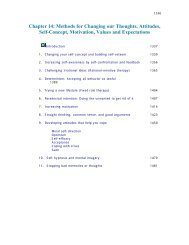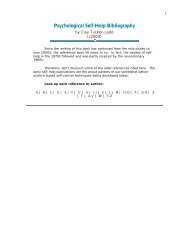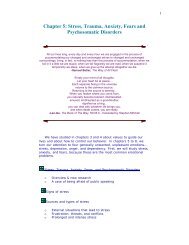Chapter 3: Values and Morals:Guidelines for living - Psychological ...
Chapter 3: Values and Morals:Guidelines for living - Psychological ...
Chapter 3: Values and Morals:Guidelines for living - Psychological ...
Create successful ePaper yourself
Turn your PDF publications into a flip-book with our unique Google optimized e-Paper software.
nirvana, reincarnation--are their big attractions, not their dem<strong>and</strong>ing<br />
guidelines <strong>for</strong> being good. Yet, being reminded of what is good,<br />
hopefully will nudge us in the right direction.<br />
"The golden rule," so called because it is the highest rule of life,<br />
is an important part of most religions. It is expressed in slightly<br />
different ways:<br />
· General wording: "Do unto others as you would have them do<br />
unto you."<br />
· Jesus Christ in the Sermon on the Mount: "There<strong>for</strong>e all things<br />
whatsoever ye would that men should do to you, do ye even so<br />
to them."<br />
(Matthew 7:12)<br />
· Judaism: "Thou shalt love thy neighbor as thyself." (Leviticus<br />
19:18)<br />
· Islam: "No one of you is a believer until he loves <strong>for</strong> his brother<br />
what he loves <strong>for</strong> himself."<br />
Note: Traditions interpret the Golden Rule in different ways, however. The above<br />
statements say DO SOMETHING! About 1000 to 3000 years be<strong>for</strong>e Jesus <strong>and</strong><br />
Muhammad, there were both positive <strong>and</strong> negative (DON'T DO) versions of the golden rule:<br />
· Confucianism: "What you do not want done to yourself, do not<br />
do to others." (Analects 15:23)<br />
· Buddhism: "Hurt not others with that which pains yourself."<br />
(Udanavarga 5:18)<br />
· Hinduism: "Good people proceed while considering that what is<br />
best <strong>for</strong> others is best <strong>for</strong> themselves." (Hitopadesa)<br />
Note: Somewhat related values are expressed by secular groups:<br />
· Humanists: "Every person has dignity <strong>and</strong> worth, <strong>and</strong>,<br />
there<strong>for</strong>e, should comm<strong>and</strong> the respect of every other person."<br />
(This is in contrast to medieval scholars who taught that life on<br />
earth was to be despised <strong>and</strong> that humans were sinful<br />
creatures who should be devoting their lives to getting into<br />
heaven.)<br />
· Communist motto: "From each according to his ability, to each<br />
according to his needs."<br />
· Indian saying: "Don't judge others until you have walked in<br />
their moccasins."<br />
Underst<strong>and</strong>ing Why We Need Meaning in Our Lives:<br />
What's Religion's Role?<br />
Baumeister (1991), in an impressive psychological <strong>and</strong> historical<br />
analysis, says that four basic needs push us to find meaning in our<br />
lives. If all four are satisfied, we feel life is meaningful; otherwise, we<br />
9












